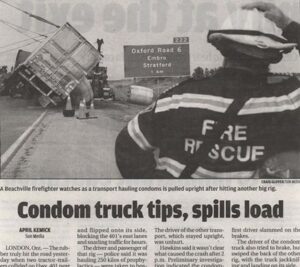 This piece is designed for any readers that fancy themselves as linguists with a cunning streak – our topic? Headlines.
This piece is designed for any readers that fancy themselves as linguists with a cunning streak – our topic? Headlines.
When writing, the headline is there for a reason. It’s the thing that will attract a reader.
So for me it is an opportunity to have some fun with the reader and give them some enjoyment too.
Likewise when reading others’ work, oftentimes the laugh is because the author may not even see the double entendre in their headline.
A few things led me to this article. I came upon a piece the other day with a headline about someone blowing a gasket. Indeed. . .
In papers, it is the sub editor who combines fixing copy, chopping for length and generally tidying up copy, with the task of writing headlines. The result can be a stroke of pure genius.
For bloggers and other writers, giving a piece a good head is entirely our own responsibility.
 Even some experienced writers don’t have the knack. Others have it down to a fine art. A former colleague populated staff magazine headlines with The Beatles’ song titles.
Even some experienced writers don’t have the knack. Others have it down to a fine art. A former colleague populated staff magazine headlines with The Beatles’ song titles.
So we had a piece about Norwegian tree research called ‘Norwegians Would’; a piece about trade union negotiations called ‘We Can Work it Out’.
From there we would be on the hunt for sports reports from University teams to see if we could get a chance to insert headlines like ‘Yellow Sub Maureen’ or in the case of a new type of long lasting coloured fabric that had been developed a piece headlined ‘Strawberry Feels Forever’.
The trick is to be able to play on words, often throwing in some sort of mild double entrendre. If you prove to be good at this it can enliven even the dullest piece.
 A few tips to bear in mind if you want to either avoid or create headlines with a double meaning.
A few tips to bear in mind if you want to either avoid or create headlines with a double meaning.
Read your headline aloud.
Consider any double meanings. If your audience is likely to appreciate the humour then go for it.
Best of all, your headline may have such a clever play on words that no-one except you will get it. How smug will you be? But remember you are writing for an audience.
Try and avoid cliches, some quotes from the Bible and Shakespeare have been done to death – the likes of ‘With a Little Help From My Friends’ and so on.
But by all means have as much craic as you can.
And so what if someone blows a gasket? There’s a load worse things can happen to even the most cunning of linguists.
